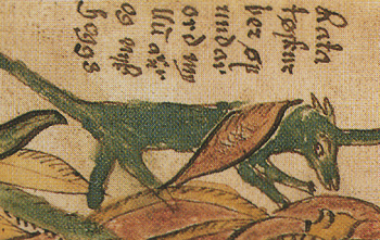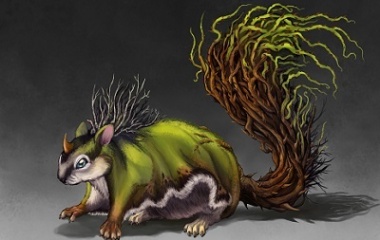Scurrying up and down the Norse tree of life is Ratatoskr, a squirrel with a taste for mischief. Ratatoskr may have big responsibilities as a messenger for the gods, but he doesn’t accept his duties meekly. This crafty squirrel puts his own spin on his role.
What is Ratatoskr?
Ratatoskr (Ratr) is a squirrel who carries messages along Yggdrasil, the tree of life. The most regular subscribers to his messaging service are the wise eagle who sits at the top of Yggdrasil, and the hungry dragon, Nidhoggr, who lies coiled among the tree’s roots. Ratatoskr relishes the chance to ferry an insult between these two mighty beasts, and by doing so, he is continually stirring the animosity between them.
Characteristics
Physical Description
Ratatoskr is described as a red squirrel. In ancient artwork, he is depicted with extremely long ears, but this could be an artifact of the art style of the time, rather than a meaningful statement about Ratr’s physique. Texts that describe Ratr don’t mention him having any features that set him apart from your typical bright-eyed and bushy-tailed red squirrel.
Personality
Ratatoskr is regarded as a troublemaker. He enjoys fueling spiteful relationships, and he may sometimes add his own embellishments to the messages sent between the eagle and Nidhoggr the dragon.
Some scholars believe that Ratatoskr may have higher ambitions than just inflaming the fraught relationship between the eagle and Nidhoggr. In some interpretations, Ratatoskr is intent on destroying the tree of life. Because he lacks the strength to do much damage to the tree by himself, Ratatoskr manipulates the eagle and the dragon into attacking the tree, which stands between them and the opportunity to fight each other. Ratr tells Nidhoggr of a particularly vicious comment the eagle made about him, and the dragon gnaws at the roots of the tree, hoping to cause it to fall and crush the eagle. Then, Ratr returns to the eagle with the news that Nidhoggr is gnawing at the tree, in an attempt to do him harm. The eagle begins to pluck branches from the tree and rain them down on Nidhoggr. With his well-placed accusations, Ratatoskr succeeds at doing great damage to the tree of life. Occasionally, the squirrel might even chip into the effort with his reputed “gnawing teeth.”
Related Characters
Ratatoskr is sometimes linked to Rati, a magical drill which the god Odin used on a quest to obtain magical mead, made from the blood of the wisest man who ever lived, out of a fortress inside a mountain. Rati was used to drill a hole in the mountain. Odin used this hole to enter the mountain in the shape of a serpent, swallowed all the mead of wisdom, and turned into an eagle before exiting the mountain again. Still in the form of an eagle, Odin ascended to Asgard (located in the top branches of Yggdrasil) to share the mead with the other gods.
The numerous parallels between Rati, in the tale of the stolen mead, and Ratatoskr, in descriptions of the tree of life, have caused many scholars to believe that Ratatoskr symbolizes Rati. Both Ratatoskr and Rati are frequently described as “gnawing.” Both allow communion between an underworld and a higher place of wisdom, and both draw a connection between a snake-like creature and an eagle. Some scholars even believe that the most direct translation of “Ratatoskr” is “Rati’s tooth.”
Ratatoskr might also symbolize the god Heimdall (also called Guillintanni or Vindler), who is renowned for his keen eyesight and hearing, and for his golden teeth. Heimdall guards the bridge between Asgard, the land of the Gods, and Midgard, the world of humanity. He is charged with sounding a warning if the bridge is ever under attack.
If Ratatoskr is, indeed, meant to represent Heimdall, then the squirrel probably has a worse reputation than he deserves. It may be his duty, rather than his desire to cause trouble, that compels Ratatoskr to carry bad news between the top and bottom of Yggdrasil. He is responsible for warning the two worlds of any threat brewing on the other side.
Outside of Norse mythology, a multitude of other messengers and mischief-makers take the form of a squirrel. The one who most resembles Ratr is Meeko, a red squirrel who wreaks havoc throughout Native American legends. Meeko has highly destructive tendencies, but because he is so small, he usually uses the anger of other creatures to carry out his schemes.
Cultural Representation
Literature
Ratatoskr appears in all three of the major literary reference points for Norse mythology: The Codex Regius, The Poetic Edda, and The Edda. These volumes span the thirteenth and fourteenth centuries and contain collections of anonymous poems and legends that pre-date the Christianization of Norse culture.
Over time, Ratatoskr has come under the scrutiny of allegorical writers and even psychoanalysts.
In his book Teutonic Mythology, Jacob Grimm, one of the famous fairytale writing Brothers Grimm, puzzled over the deeper meaning of Ratr’s role in Norse mythology. He concluded that Ratatoskr helped maintain balance in the tree of life. Yes, he caused tension and destruction, but that tension and destruction helped keep the tree straight and allowed it to put out new growth.
In an essay titled “Ratatosk: The Role of the Perverted Intellect,” Lilla Vesy-wagner, a psychoanalyst, linked Ratatoskr’s intelligence with his taste for conflict. She argued that intelligence, like Ratr has, often causes conflict between the demands of the id and the superego, which might be symbolized by the wise eagle and the hungry dragon.
Visual Arts
Little artwork remains from the heyday of pre-Christian Norse culture, so most depictions of Ratatoskr have been touched by the influences of Christianity. Over time, the symbols of the Norse tree of life and the Christian cross became intertwined, as can be seen in the famous Ruthwell and Bewcastle crosses. These large stone crosses are rich with carvings that harken back to “pagan” imagery. Squirrels can be seen climbing up and down the crosses—but they look much tamer than the mischievous Ratr of old.
In the art and entertainment of today, Ratr makes a return to his old self. He is a popular melee character in the video game Smite, and he appears in Marvel Comics as a supervillain let loose by Loki to spread chaotic ideas and rumors on earth.
Explanation of the Myth
It’s not difficult to guess why a red squirrel was selected to play the role of Yggdrasil’s fussy messenger—nor why the squirrel has played a similar role in the legends of cultures across the world. Nimble, loud, and somewhat aggressive, squirrels just fit the bill. It’s easy to imagine that a squirrel who barks at you for walking near the hole where he has hidden his acorns, then rushes up tree and vanishes with one flourish of his fluffy tail, is going to fill the ear of some god with an abusive account of your behavior. The squirrels who fussed at Norsemen from the canopies of Europe’s old forests probably inspired Ratatoskr.











Helpful!